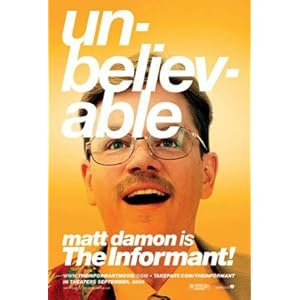Airing on Cinemax: At Home In Your Home
With the failure of THE INFORMANT! at the box-office in 2009 (it grossed around $41M worldwide), Steven Soderbergh seemed to reach a crossroads in his career. Informantfollowed the even bigger financial flop of his ambitious 2-part Che, and soon afterward he announced his intention to retire from directing films. He now has 2 thrillers awaiting release (Haywire and Contagion), and then he plans to direct a biography of Liberace starring Michael Douglas and Matt Damon, and a big-screen version of the TV show “The Man From Uncle” starring George Clooney, and after that hang up his viewfinder.
I don’t think anyone would be surprised to see Soderbergh change his mind and head back behind the camera after he’s taken some time to smell the roses, but it’s sad to see one of our more original and talented filmmakers feel the need to step away. Soderbergh has always been a fascinating fit in Hollywood, with his mix of avant-garde aesthetics and mainstream storytelling skill, and for a while he made it work. He adopted the “one for me, one for them” strategy, and interspersed hits in the Ocean’s series with more daring projects like Solaris and The Good German. Somewhere along the way, though, he seems to have let the subtexts of his studio projects overwhelm the entertainment value.
The great theme of Soderbergh’s work is the perception of reality, or more properly its misperception, and very often its manipulated perception. Sometimes this happens through the deliberate actions of its protagonists (all the Ocean’s movies are essentially extended con games, in which the duped are made to see things that aren’t there), while other times the protagonists themselves are caught in delusion (the astronauts who experience and perhaps create projections of their loved ones in Solaris, the prostitute who falls for her own illusion of emotional intimacy in The Girlfriend Experience). In recent years, Soderbergh has increasingly applied this theme to the act of moviemaking itself, and in a very meta way: the film-within-a-film (within a film?) of Full Frontal gave way to Julia Roberts playing a woman who impersonates “Julia Roberts” (and in doing so interacts with Bruce Willis, playing “himself”) ini Ocean’s 12. In The Good German, he used the grammar and technology of classic Hollywood postwar dramas to tell a story about corruption instead of redemption, and he undermined the concept of a “biography” film in Che.
The Informant! is, in theory, a true story about agri-business executive Mark Whitacre (Matt Damon) who tells the FBI that his company is involved in a price-fixing conspiracy, but who turns out himself to have more to hide than anyone could imagine. As told by Soderbergh (screenplay by Scott Z Burns), it’s a festival of perceptual tricks and alienation effects. Whitacre’s stream-of-consciousness voiceovers fill the soundtrack, in a way that first seems amuisng but becomes recognizably the wanderings of a dissociated mind. Marvin Hamlisch’s score remains jokey and upbeat no matter what’s happening on screen, insistently repeating the same few refrains. Soderbergh served as his own cinematographer as is his usual practice (under the pseudonym Peter Andrews), using his favored RED digital video camera and keeping the film in a perpetual state of brownish florescent glow. As a viewer, you never get a grip on what’s really going on, which may be appropriate to the experience being depicted but becomes increasingly uncomfortable to watch. In short, Informant is a worthy piece of artwork that wasn’t likely to please a wide audience, and Soderbergh may have been fooling himself if he believed otherwise.
Perhaps Soderbergh really does need to get away from Hollywood studios and their world of franchise blockblusters and mainstream marketing. One hopes, though, that he won’t go too far, and that he’ll find his way back to challenge, and maybe even entertain, audiences again.
–Mitch Salem





